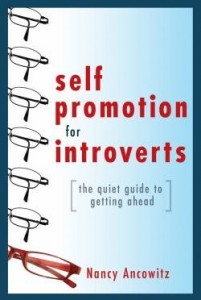Help for Introverts… Like Me
I’ll admit it. I’m an introvert. Although in my work environment, I don’t think it’s blatantly obvious. I’m not afraid of public speaking or making presentations. I can mingle at business events and parties when I have to (but I don’t enjoy it). But in most ways, I am the classic introvert: I listen more than I talk, I like my alone time, I don’t need a lot of people around me to feel energized, I don’t like crowds, I’m quiet rather than gregarious, I’m more introspective and generally reserved.
Introversion should not be confused with shyness, although the two are sometimes married. It’s taken me a while to come to terms with my introversion and to realize that it’s not necessarily a bad thing. It’s just the way I am. Like being a lefty in a right-handed world (which I am also). I have no problems with self-esteem, and my parents raised me to be a confident human being. I’m just wired to be an introvert.
 I’ve recently learned that there is an entire industry devoted to folks like me with books, seminars, websites and more which help us channel our introverted gifts toward success. A fellow introvert recommended I read the book Self-Promotion for Introverts by Nancy Ancowitz. The author presented some interesting statistics, such as that half the population are introverts, and include among them notables such as Bill Gates, Steven Spielberg and even Jerry Seinfeld. Not bad company.
I’ve recently learned that there is an entire industry devoted to folks like me with books, seminars, websites and more which help us channel our introverted gifts toward success. A fellow introvert recommended I read the book Self-Promotion for Introverts by Nancy Ancowitz. The author presented some interesting statistics, such as that half the population are introverts, and include among them notables such as Bill Gates, Steven Spielberg and even Jerry Seinfeld. Not bad company.
While some of Ancowitz’ book is typical self-help content (reflecting on oneself, etc., etc.,) complete with fill-in-the-blank tables and charts, I did glean some useful suggestions. One idea I liked was changing an internet password to a positive affirmation phrase (her example was “deepthinker”) which gives one a little boost whenever the password is used (which is probably several times a day). The book also nicely summed up strengths traditionally found among introverts, including researching, concentrating, gaining expertise, building long-lasting relationships and listening attentively, and encouraged the introvert to use these to his or her advantage. Even speaking quietly or infrequently can be a strength in that when introverts do speak, they tend to offer more thoughtful, quality content. And if introverts can get a word in edgewise, the audience is probably so stunned to hear them speak that they pay greater attention! Well, maybe.
Some key suggestions in being able to promote one’s introverted self are to set short- and long-term goals (which applies for extroverts as well), develop a list of marketing activities within one’s comfort level (perhaps emailing is easier than cold-calling!), and cultivate a network of supporters. The book also reminds introverts to be mindful of their particular needs including making sure we build in down time to recharge after being “on” in social situations, and budget sufficient time to prepare for meetings and other presentations.
So introverts, speak up! Be proud. Make your mark. Then you can retreat to your livingroom by yourself with a good book.
I have subscribed and put the blog on my iGoogle Home Page <>. Will look forward to your insights and comments. Congratulations!
Barbara,
Thanks so much!
I’m not a social introvert…but don’t like to be forced to interact with groups I prefer not to. (There are times when I do prefer to stay at home with a book or a computer.)
And I am very introspective and thoughtful, and can exhaustively ruminate and ponder issues and subjects until I feel I’m ready to move on to do something else.